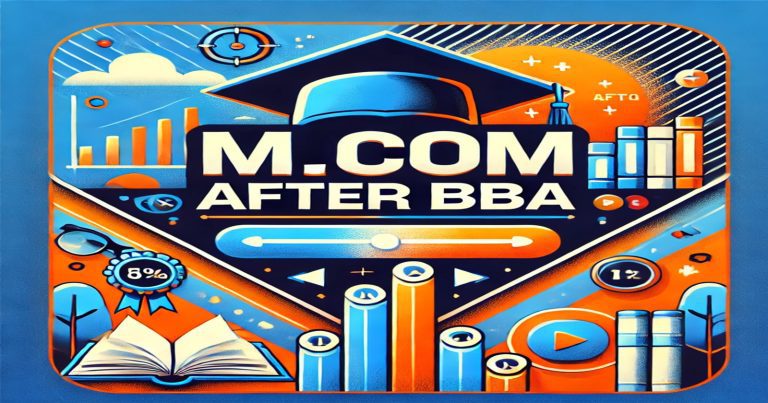Can I do M Com after BBA is a question most of us have in mind Well, the response is yes, you can study MCOM after a BBA provided you fulfill the eligibility of the university or institution. So, an MCom provides in-depth knowledge in the field of commerce and finance. It is very helpful for BBA graduates with aspirations for advanced career prospects in commerce, banking, and finance. Here in this article, we will tell everything about MCom including eligibility criteria, course details, challenges, and career prospects after pursuing MCom after BBA.
What is MCom?
MCom is a postgraduate degree specializing in advanced concepts in commerce, finance, accounting, and economics. The course is meant to be taken by students wishing to acquire specialist knowledge in business management, taxation, statistics, and corporate finance. It allows students to understand the more complex aspects of finances and trade in businesses.
The MCom builds upon the basic undergraduate knowledge in BBA or BCom. It develops more extensive capabilities for professional high-level employment areas, including banking, finance, auditing, consulting, and even in academic circles. Further, students in the MCom program can prepare themselves for professional qualifications, such as CA (Chartered Accountancy) and CFA (Chartered Financial Analyst). This opens up the best possible career options and opportunities for an individual dreaming of specializing in functions under finance or planning and being absorbed into the academia and research streams.
MCom Course Details
The course details of MCom are important for the students who will pursue it. The MCom course is usually a two-year postgraduate course that is divided into four semesters. It offers a combination of theoretical knowledge and practical skills in commerce, finance, and business management. The curriculum usually includes advanced accounting, business statistics, corporate laws, and international finance.
M com Course Duration and Structure
The MCom program usually takes two years to complete. It is typically divided into four semesters. Each semester involves core subjects and electives in which a student can specialize according to his choice. Universities allow both full-time and distance learning, making it easy for professionals to continue upgrading their qualifications while working. Students can choose the learning mode between classroom and self-paced study because of the flexibility involved.
Eligibility for MCom
MCom’s eligibility is usually a bachelor’s degree in commerce or another relevant field like BBA from any recognized university. Most universities ask for 50% marks at the graduation level. Apart from this, some colleges may conduct entrance exams for the mcom admissions. Preparing for the entrance exams requires a recapitulation of the subjects of economics, accounting, and quantitative aptitude. The first step to joining a credible MCom program is to meet the eligibility criteria.
IGNOU MCom Admission Eligibility
The eligibility criteria for MCom in IGNOU also reflect that of other universities; therefore, holding a bachelor’s degree in commerce or any other relevant field is necessary. IGNOU differs in the admission policy because of its flexibility, which facilitates the enrollment process of working professionals and distance learners into this university. Therefore, admission to the IGNOU MCom is eligibility-based and has no work experience and entrance examination requirement; thus, it is quite popular amongst students on a quest for cheaper education options which are pretty flexible too. IGNOU distance mode helps students learn on the go by allowing the same to remain working.
MCom Fees
MCom fees vary based on the university and type of study. MCom from a public university is rather cheap, usually ranging between ₹10,000 and ₹50,000 annually. In contrast, private institutions charge higher due to better infrastructure and facilities, which range between ₹50,000 and ₹2,00,000 annually. MCOM from IGNOU costs about ₹15,000 for the whole course, one of the cheapest for students.
| University Type | Approximate Fees (INR) |
| Public Universities | ₹10,000 – ₹50,000 per year |
| Private Universities | ₹50,000 – ₹2,00,000 per year |
| IGNOU (Distance Learning) | Around ₹15,000 for the entire course |
Can a BBA Graduate Pursue an MCom?
Yes, of course, a BBA graduate can pursue an MCom. Although MCom is traditionally meant for BCom graduates, most universities accept BBA graduates since the curriculum of BBA overlaps much with BCom in the business and finance curriculum. Therefore, the transition from BBA to MCom will be quite smooth, especially for students with a good grounding in financial management, marketing, and business law.
The common subjects of accounting, business law, and management make MCom a suitable option for BBA graduates. However, in some universities, even BBA graduates are asked to undertake additional courses or bridge courses to cope with the advanced topics in MCom. However, the skills and knowledge generated and acquired through MCom are of immense value and make it worthwhile for BBA graduates to pursue.
Advantages of MCom after BBA
Pursuing an MCom after a BBA has several advantages, which largely increase one’s career.
Deeper Understanding of Commerce and Finance. MCom imparts specialized knowledge in taxation, international business, and corporate finance. The advanced level of knowledge in those fields will allow a BBA graduate to understand complex financial systems better than others. Thus, it makes graduates more competitive in the job market, allowing them to take positions requiring specialized expertise.
- Rewarding Salary: MCom students normally get job opportunities in various fields with higher-priced jobs than others with BBA degrees. Since the specialized training that the candidate undergoes while acquiring an MCom degree prepares for higher and better prospects in banks, consulting, and corporate finance, such opportunities may eventually allow them higher salary packages, better stability, and job security as well.
- Professional qualification access: With an MCom qualification, candidates have access to professional qualifications such as CA (Chartered Accountancy), CFA (Chartered Financial Analyst), or CMA (Certified Management Accountant). Those who qualify for the certificates along with MCom qualify and are exposed to high-level finance and auditing jobs.
- Networking and Professional Growth: The MCom program will be seminars, workshops, and networking events where the student can meet industry experts as well as his fellow students, thus opening a platform for mentorship, internships, and job offers in the long run.
How to Prepare for MCom after BBA?
To succeed in an MCom program after completing a BBA, a lot needs to be prepared for. Understand the mom eligibility criteria set by various colleges. Get enough academic marks and ensure satisfactory marks in minimum percentage and entrance examinations. Having clear knowledge about it will streamline the application process. It increases the chances of getting an admission.
- Build on Commerce Knowledge: Since MCom focuses on advanced commerce topics, it is always beneficial for the BBA pass-out to fill up the knowledge gaps in subjects like accounting, business law, and financial management. One can fill the gaps in knowledge by taking online courses, reading reference books, and using tutorials. This proactivity will enable you to cope with the MCom curriculum better.
- Preparation for Entrance Exams: Many universities require an entrance exam for Mcom admission. These exams mostly analyze knowledge in the areas of commerce, economics, and quantitative aptitude. Regular practice of mock tests and previous year’s papers will improve your marks and increase your chances at a very prestigious university.
- Select a Specialization: Taking a specialization early on will help guide your studies and career path. Options like taxation, finance, or international business will shape your expertise and job opportunities. Knowing the scope and demand of each specialization helps make this choice better.
Problems You Will Find During MCom After BBA
It is worth taking the route for MCom after BBA, but not without problems. From BBA to MCom
- Change in the curriculum: The BBA curriculum focuses more on management and business operations than MCom, which gets into commerce and finance. As a result, BBA students have to invest extra effort into learning the deeper concepts of accounting and taxation.
- Balancing Study with Other Obligations: For working people who pursue their MCom studies through distance mode, time management becomes very hectic.
- Financial Difficulty: An MCom program can be very costly to follow, especially in private universities. Budget and prepare finances before seeking admission.
Careers After MCom for BBA Students
MCom offers numerous career prospects to BBA graduates. Top Career Options
- Banking and Finance: Graduates in MCom can work as financial analysts, investment bankers, or loan officers in top banks and financial institutions.
- Corporate Jobs: Many companies recruit MCom graduates for various jobs including financial managers, tax consultants, and auditors.
- Academia and Research: If you are teaching-oriented, then you can pursue a career as a lecturer or even a research-based postgraduate degree in the form of a PhD.
- Entrepreneurship: You can be an entrepreneur with in-depth knowledge about commerce and business.
M com after BBA FAQs
1. Can I do M Com after BBA?
Yes, you can go for MCom after BBA. Universities will accept BBA degree holders for pursuing MCom only if they qualify for the entrance test.
2. What is the eligibility for MCom?
You can apply for an MCom after getting a bachelor’s degree in commerce or a BBA from a recognized institute. Some colleges and universities ask for a minimum percentage or require you to clear an entrance exam.
3. What are the details of mom courses?
The MCom is a 2-year postgraduate course. This is for the study of advanced topics related to commerce, finance, and business management. It covers core subjects, electives, and a research project.
4. What is the eligibility for MCom in IGNOU?
Eligibility: M Com offered by IGNOU requires any degree in commerce or its equivalent. IGNOU doesn’t count for work experience and does not require entrance exams.
5. How much do the MCom fees in India cost?
The fees of an M Com course vary in every university. Public universities charge between ₹10,000 – ₹50,000 per year while private universities can charge almost up to ₹2,00,000 per year.


